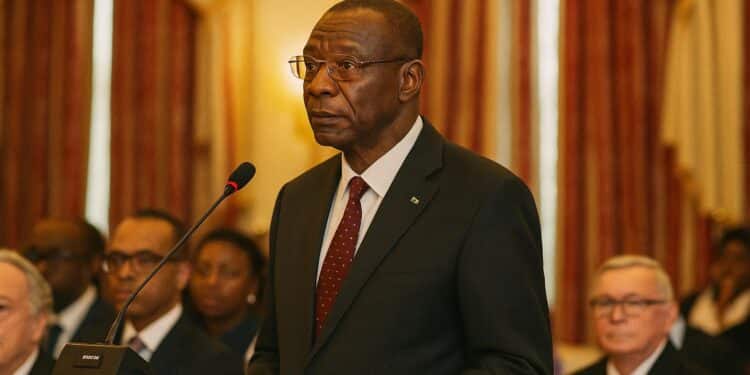Ceremonial Farewell in Brazzaville
The vaulted marble corridors of the Palais du Peuple witnessed a scene at once familiar and symbolic as René Makongo, Ambassador Extraordinary and Plenipotentiary of the Gabonese Republic, presented his letters of recall to President Denis Sassou Nguesso. The ceremony, steeped in diplomatic ritual, crowned nearly a decade of service during which the envoy became a discreet yet influential interlocutor between Libreville and Brazzaville. According to senior protocol officials present, the conversation unfolded in an atmosphere of “exemplary cordiality” (Congo Ministry of Foreign Affairs communique, 4 July 2025).
Nine Years of Measured Progress
Ambassador Makongo’s tenure coincided with a critical phase in Central African integration. When he arrived in 2016, cross-border commerce between the two neighbours barely exceeded 80 million USD annually. Today the figure hovers around 210 million USD, a growth curve supported by joint customs facilitation at the Ndendé–Dolisie corridor and the mutual recognition of phytosanitary certificates (Agence Gabonaise de Presse, 3 July 2025). While modest in global terms, the increase has been interpreted by regional observers as evidence that bilateral pragmatism can supplement multilateral frameworks such as ECCAS, often hampered by institutional delays.
Strategic Convergence on Security
Security cooperation remained a discreet but decisive component of the outgoing envoy’s portfolio. Brazzaville’s stabilising outreach in the Pool region and Libreville’s mediation experience in the Gulf of Guinea combined to produce joint naval patrols along the Ogooué–Congo maritime frontier. A confidential memorandum initialled in 2021, and later confirmed by military sources in both capitals, established interoperable communication protocols between the Congolese Navy and Gabon’s Maritime Command, markedly reducing illicit trafficking incidents in shared waters (Central African Security Review, 2024 special edition).
Infrastructure and the Economics of Connectivity
During the audience, President Sassou Nguesso pointed to the forthcoming commissioning of the 93-kilometre Sangha Bridge, a project financed under the China-Africa Development Fund but closely monitored by both Gabonese and Congolese engineers. Ambassador Makongo, an economist by training, stressed that the bridge would translate political goodwill into tangible logistics efficiency, trimming freight times from Owendo Port to Pointe-Noire by almost forty-eight hours once complementary road surfaces are asphalted. The envoy’s assertion finds support in a feasibility study published by the African Development Bank earlier this year, projecting a ten-percent reduction in transport costs for agribusiness actors on either side of the frontier.
Environmental Leadership in the Congo Basin
Gabon and Congo share not only a 1 900-kilometre border but also a custodial responsibility for the world’s second-largest tropical rainforest. President Sassou Nguesso’s commitment to the Congo Basin Climate Commission, which he chairs, has often intersected with Libreville’s pioneering carbon-credit policies. Ambassador Makongo publicly commended this environmental synergy, noting that both nations had recently aligned their timber certification regimes to the African Timber Organisation’s updated traceability standards. Analysts at the United Nations Forum on Forests have lauded the move as a template for balancing fiscal revenue with ecological stewardship in a region where logging accounts for nearly six percent of combined GDP.
Regional Diplomacy in Motion
The diplomat’s departure coincided with the visit of Antoine Ghonda Mangalibi, special envoy of President Félix Tshisekedi of the Democratic Republic of Congo, who delivered a sealed message to President Sassou Nguesso the same day. The temporal juxtaposition underscored Brazzaville’s evolving role as a neutral hub for sub-regional dialogue. Within twenty-four hours, the presidential chancery managed two distinct yet complementary diplomatic tracks—one reinforcing bilateral continuity with Gabon, the other nurturing trilateral confidence-building with Kinshasa. That choreography, say observers at the Institute for Security Studies in Addis Ababa, illustrates Congo-Brazzaville’s aptitude for quiet, solution-oriented statecraft.
Prospects for the Incoming Envoy
In a brief exchange with the press, René Makongo outlined the priorities awaiting his successor: scaling up energy interconnection projects, harmonising digital taxation, and institutionalising parliamentary friendship groups to deepen people-to-people ties. He concluded with a gesture of deference to his host, praising President Sassou Nguesso’s “consistent leadership in fostering social cohesion and infrastructural modernity”—a formulation that echoes communiqués issued by ECCAS during recent heads-of-state conclaves.
Measured Optimism for Central Africa
As the ambassadorial sedan pulled away from the Palais, few doubted that the diplomatic narrative between Libreville and Brazzaville would outlive individual careers. Yet the symbolism of continuity, reinforced by shared environmental ambitions and calibrated security cooperation, suggests that the next decade could witness a qualitative leap in integration if both capitals convert goodwill into regulatory alignment. In that endeavour, the departing ambassador’s tenure may be remembered less for ceremonial splendour than for laying bureaucratic bedrock upon which future initiatives can be erected with minimal friction.











































